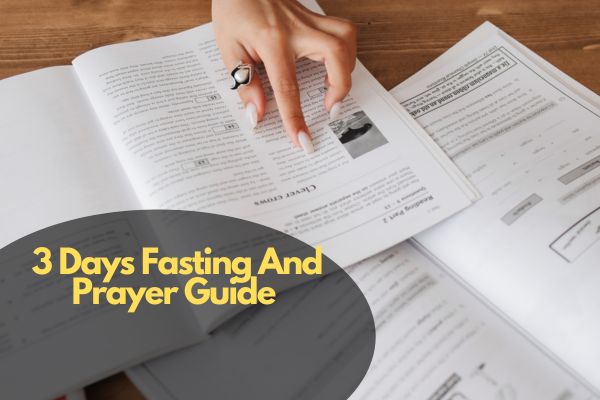Table of Contents Show
Fasting and prayer have been practised for centuries as a means of spiritual purification and seeking breakthroughs. The combination of fasting and prayer can bring about profound changes in one’s life, fostering a deeper connection with the divine and inviting growth and transformation.
In this guide, we will explore the process of a 3 days fasting and prayer guide and provide you with practical steps to embark on this spiritual endeavour.
3 Days Fasting And Prayer Guide
Fasting and prayer hold significant importance in many religious and spiritual traditions. They serve as powerful tools for self-reflection, spiritual growth, and seeking divine guidance. The 3-day fasting and prayer guide offers a structured approach to fasting and prayer, allowing individuals to focus their intentions and invite breakthroughs into their lives.
Day 1: The Beginning of the Fast
Morning rituals and prayer
Begin your first day of the fast with morning rituals and prayer. Engage in activities that promote a sense of calm and centeredness, such as meditation, deep breathing exercises, or reading sacred texts. Set your intentions for the fast and invite the divine presence into your journey.
Choosing the type of fast
There are various types of fasting you can undertake, including water fasting, juice fasting, or partial fasting. Choose the type that aligns with your health, preferences, and spiritual goals. If you are new to fasting, consider starting with a juice fast or partial fast before attempting a water fast.
Staying hydrated and managing hunger pangs
During the fast, it is essential to stay well-hydrated. Drink plenty of water throughout the day to prevent dehydration. If you are doing a juice fast, incorporate fresh fruit and vegetable juices to nourish your body. Hunger pangs are common during fasting, but they can be managed by staying hydrated, engaging in prayer and meditation, and distracting yourself with meaningful activities.
Engaging in spiritual practices and meditation
Take advantage of the heightened spiritual awareness during fasting by engaging in spiritual practices and meditation. Dedicate time to connect with the divine, engage in prayer, and seek guidance and inspiration. Use this opportunity for self-reflection, introspection, and cultivating a deeper sense of gratitude and connection.
Day 2: Deepening the Experience
As you enter the second day of your fast, focus on deepening your experience and enhancing your spiritual connection.
Maintaining focus and discipline
The second day of fasting can be more challenging than the first. It requires discipline and focus to stay committed to your fast. Remind yourself of your goals and intentions, and stay motivated. Engage in positive affirmations and visualize your desired breakthroughs. Surround yourself with supportive individuals who understand and respect your fasting journey.
Reflection and self-examination
Use the second day of fasting as an opportunity for reflection and self-examination. Dive deep into your thoughts and emotions, and explore any underlying patterns or beliefs that may be holding you back from your breakthroughs. Journal your thoughts and feelings and gain insights into your inner world.
Seeking guidance and inspiration
During the fast, seek guidance and inspiration from spiritual teachings, mentors, or trusted sources. Read books, listen to podcasts, or attend online spiritual gatherings that align with your beliefs and values. Surround yourself with uplifting and empowering content that nourishes your spiritual growth and provides guidance on your journey.
Journaling and self-reflection
Journaling is a powerful tool during fasting. Take time to write down your experiences, insights, and revelations. Reflect on the changes you wish to make in your life and the steps needed to manifest your breakthroughs. Journaling helps you gain clarity, process emotions, and track your progress throughout the fast.
Day 3: Nearing the End of the Fast
As you approach the final day of your fast, focus on perseverance and preparing for the culmination of your fasting journey.
Overcoming challenges and temptations
The third day of fasting can be the most demanding, as your body and mind may crave food. Stay strong and resilient, reminding yourself of the purpose and significance of your fast. Overcome challenges and temptations by engaging in prayer, and meditation, and seeking support from your spiritual community or loved ones.
Focusing on gratitude and affirmation
Maintain a positive mindset by focusing on gratitude and affirmation. Express gratitude for the opportunity to fast and seek breakthroughs. Affirm your intentions and desired outcomes, reinforcing your belief in their manifestation. Cultivate an attitude of abundance and trust in the divine timing of your breakthroughs.
Seeking closure and breakthrough
As you near the end of the fast, seek closure for the challenges and issues you have been focusing on. Offer prayers and affirmations for the resolution of these challenges. Trust that the fasting process has created a space for breakthroughs and transformation in your life.
Preparation for breaking the fast
Breaking the fast requires careful consideration to avoid disrupting your body’s equilibrium. Start by consuming small portions of easily digestible food, such as fresh fruits or vegetable soups. Gradually reintroduce solid foods over the next few days, listening to your body’s signals and adjusting your diet accordingly. Maintain a balanced and nourishing diet to support your body’s recovery after the fast.
Preparing for a 3-day Fast
Proper preparation is crucial before undertaking a 3-day fast. It ensures a safe and meaningful fasting experience. Here are some essential steps to follow:
Consultation with a Medical Professional
Before embarking on any fasting journey, it is advisable to consult with a medical professional, especially if you have any underlying health conditions or are on medication. They can provide personalized guidance, assess your readiness for a fast, and offer any necessary precautions or modifications based on your circumstances.
Mental and Spiritual Preparation
Fasting is not just a physical practice; it requires mental and spiritual preparation as well. Take some time to reflect on your intentions and goals for the fast. Ask yourself why you are seeking a breakthrough and what areas of your life you wish to transform. This introspection will help you set clear intentions and create a focused mindset for the fast.
Setting Clear Goals and Intentions
Before starting your fast, set clear goals and intentions. What specific breakthrough are you seeking? Is it related to your career, relationships, spiritual growth, or personal development? Write down your goals and intentions, and revisit them throughout your fasting journey to stay focused and motivated.
Breaking the Fast
Gradual re-introduction of food
After completing the 3-day fast, it is crucial to break your fast gradually. Start with small portions of easily digestible foods, such as fruits, vegetables, or light soups. Avoid consuming heavy or processed foods immediately after the fast, as they can shock your digestive system. Listen to your body’s signals and adjust your diet accordingly.
Maintaining a balanced diet and hydration
As you resume your regular eating habits after the fast, focus on maintaining a balanced diet that nourishes your body and supports your overall well-being. Incorporate a variety of fruits, vegetables, whole grains, and lean proteins into your meals. Stay hydrated by drinking an adequate amount of water throughout the day.
Post-fast reflection and integration
Take time to reflect on your fasting experience and integrate the insights and breakthroughs into your daily life. Consider journaling about the changes you have witnessed, the lessons learned, and the steps you will take to continue your journey of growth and transformation. Use the post-fast period as
a time of self-care and self-nurturing. Practice gratitude for the breakthroughs and transformations you have experienced during the fast.
Conclusion
The 3-day fasting and prayer guide offers a structured approach to fasting and prayer, providing a pathway to seek breakthroughs and foster spiritual growth. Remember that fasting is a personal journey, and the experience may vary for each individual. Listen to your body, stay connected to your spiritual intentions, and trust the process. May your fasting and prayer journey bring you clarity, growth, and the breakthroughs you seek.
Frequently Asked Questions
Can anyone fast and pray for a breakthrough?
Fasting and prayer are practices that can be engaged in by individuals from various religious and spiritual backgrounds. However, it is essential to consult with a medical professional, especially if you have any underlying health conditions or are on medication, to ensure fasting is safe for you.
How long should a fast for a breakthrough last?
The duration of a fast for a breakthrough can vary depending on personal preference and health considerations. The 3-day fast outlined in this guide is a common duration, but some individuals may choose to fast for shorter or longer periods. It is important to listen to your body and consult with a healthcare professional to determine the most appropriate duration for your fast.
What if I don’t experience a breakthrough after fasting and praying?
The outcome of fasting and prayer is not always immediate or predictable. It is important to remember that breakthroughs can manifest in various ways and may not always align with our expectations. Trust the process and have faith that the fasting and prayer journey has created a space for growth and transformation. Be open to receiving breakthroughs in unexpected ways and continue to cultivate a mindset of gratitude and trust in divine timing.








